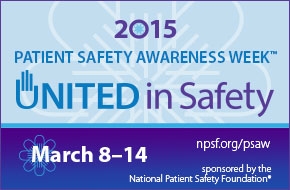Patient Safety Awareness Week: how to improve communication between patients and health care providers to mitigate harm?
 Medical errors and adverse events are among the leading causes of death and personal injury in the U.S. According to a recent study in the Journal of Patient Safety the number of premature deaths associated with preventable harm to patients is estimated at more than 400,000 per year. Serious harm seems to be 10- to 20-fold more common than lethal harm.
Medical errors and adverse events are among the leading causes of death and personal injury in the U.S. According to a recent study in the Journal of Patient Safety the number of premature deaths associated with preventable harm to patients is estimated at more than 400,000 per year. Serious harm seems to be 10- to 20-fold more common than lethal harm.
The patient safety awareness week is an annual campaign led by the National Patient Safety Foundation to create awareness about patient safety among healthcare providers and their patients. The campaign is running this week and the subject is “United in safety” . The emphasis is on better communication between healthcare providers and patients to reduce adverse events or medical errors.
Tomorrow Wednesday March 11th at 8:30 pm ET anyone interested can join a twitter chat on patient and family engagement using #PSAWunited to participate. People interested can also join a free webcast on patient safety on Thursday March 12th.
 New York Personal Injury Attorneys Blog
New York Personal Injury Attorneys Blog


